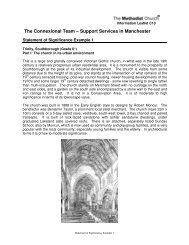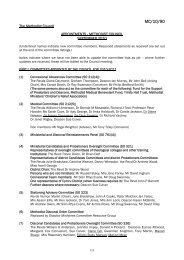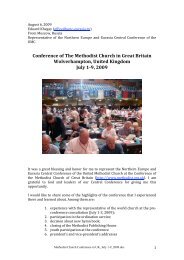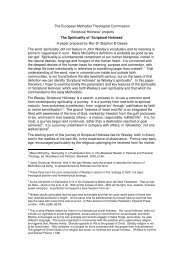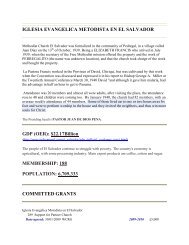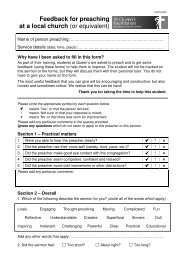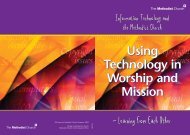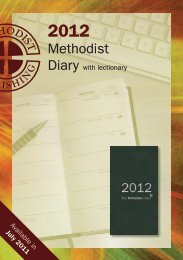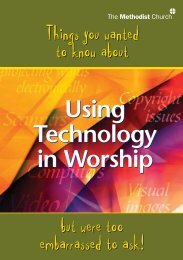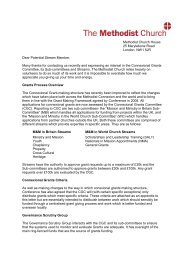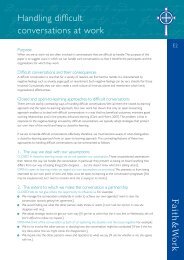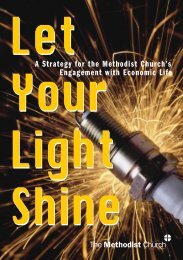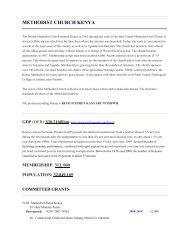Discipleship and the people called Methodists - BEH District
Discipleship and the people called Methodists - BEH District
Discipleship and the people called Methodists - BEH District
You also want an ePaper? Increase the reach of your titles
YUMPU automatically turns print PDFs into web optimized ePapers that Google loves.
Three simple rules…?<br />
Well, what about <strong>the</strong> rules <strong>the</strong>mselves? They are <strong>the</strong>se. Do no harm. Do good.<br />
Love God. Are you surprised by how few <strong>the</strong>re are? How short <strong>the</strong>y are? This kind<br />
of rule necessarily requires examples, <strong>and</strong> John Wesley offered early <strong>Methodists</strong><br />
lots of <strong>the</strong>m.<br />
To ‘do no harm’ meant to “avoid evil”, he said. Therefore <strong>Methodists</strong> were not<br />
to take <strong>the</strong> name of God in vain, <strong>the</strong>y weren’t to get drunk, fight, quarrel, go to law<br />
with fellow Christians, or do those things which <strong>the</strong>y knew didn’t glorify God. Nor,<br />
specifically, should <strong>the</strong>y buy or sell ‘uncustomed’ (ie black market) goods, borrow<br />
without a probability of paying back, or more generally “lay up treasure on earth”. To<br />
live by this rule would be evidence of a continuing desire to be a disciple of Jesus.<br />
To ‘do good’ meant <strong>Methodists</strong> being kind <strong>and</strong> merciful to all <strong>people</strong>, as far<br />
as was possible. This goodness was directed at both <strong>the</strong> body <strong>and</strong> <strong>the</strong> soul.<br />
Goodness to <strong>the</strong> body meant giving food to <strong>the</strong> hungry, clothing <strong>the</strong> naked, visiting<br />
or helping <strong>the</strong> sick <strong>and</strong> those in prison. Goodness to <strong>the</strong> soul included evangelising,<br />
“instructing <strong>and</strong> reproving”, encouraging all <strong>the</strong>y met <strong>and</strong> bearing witness to God’s<br />
goodness. Wesley said that <strong>Methodists</strong> should deny <strong>the</strong>mselves <strong>and</strong> follow Christ<br />
daily, enduring any reproach or suffering for <strong>the</strong> sake of <strong>the</strong> Lord. To live by this rule<br />
would be evidence of a continuing desire to be a disciple of Jesus.<br />
‘Loving God’ entailed “attending upon all <strong>the</strong> ordinances of God”. Wesley lists<br />
<strong>the</strong>se as public worship, <strong>the</strong> ministry of <strong>the</strong> Word, “ei<strong>the</strong>r read or expounded”, <strong>the</strong><br />
Lord’s Supper, family <strong>and</strong> private prayer, searching <strong>the</strong> Scriptures <strong>and</strong> fasting or<br />
abstinence. To live by this rule would be evidence of a continuing desire to be a<br />
disciple of Jesus.<br />
In 779 a much older John Wesley wrote a sermon (Sermon 07, titled ‘On<br />
God’s Vineyard’) in which he provides perhaps <strong>the</strong> best single statement about <strong>the</strong><br />
Methodist way of forming disciples. Assuming attendance at <strong>and</strong> membership of<br />
both society <strong>and</strong> class he wrote:<br />
Nothing can be more simple, nothing more rational, than <strong>the</strong><br />
Methodist discipline: It is entirely founded on common sense,<br />
particularly applying <strong>the</strong> general rules of Scripture. Any person<br />
determined to save his (sic) soul may be united (this is <strong>the</strong> only<br />
condition required) with <strong>the</strong>m. But this desire must be evidenced<br />
by three marks: Avoiding all known sin; doing good after his<br />
power; <strong>and</strong>, attending all <strong>the</strong> ordinances of God.



